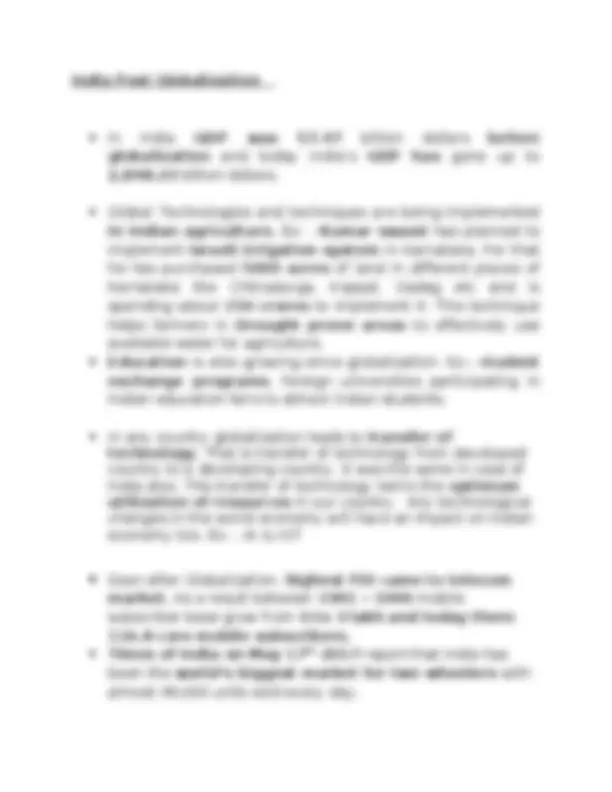




Study with the several resources on Docsity

Earn points by helping other students or get them with a premium plan


Prepare for your exams
Study with the several resources on Docsity

Earn points to download
Earn points by helping other students or get them with a premium plan
Community
Ask the community for help and clear up your study doubts
Discover the best universities in your country according to Docsity users
Free resources
Download our free guides on studying techniques, anxiety management strategies, and thesis advice from Docsity tutors
The effects of globalization on india's economy, focusing on the introduction of economic liberalization, the role of foreign direct investment (fdi), and the transfer of technology. The text also discusses the impact of globalization on various sectors such as agriculture, education, telecommunications, and industries.
Typology: Assignments
1 / 4

This page cannot be seen from the preview
Don't miss anything!



Effects of Globalization on Indian Economy Introduction The term Globalization was coined in 1960s by Theodore Levitt , a former professor from Harvard Business School. Globalization is a process, which involves economic interdependence of countries worldwide removing all barriers for economic integration. Indian Economy before Globalization There were stringent controls on the import of a large number of a large number of commodities, and likewise controls over foreign investments through a complicated licensing system which in most cases did not allow more than 40 percent of the equity in any company to be held by foreign capital. In this sense it could be said that there was considerable state intervention in the economy. The system – popularly known as ‘license-permit raj’ – provided a protected environment in which domestic industry could develop and grow. During the budget of 1991 the then finance minister Dr. Manmohan Singh introduced economic liberalization (P V Narasmha Rao). This led to the full-fledged integration of Indian economy with global economy. In other terms introduction of economic liberalization led India towards rapid globalization. (Include point about Free Trade point). To globalize themselves different countries take trade related measures and developmental policies so as to increase cross border trade relations. The same way, Indian government also took 4 major measures to encourage Globalization: i) Reduction of trade barriers so as to permit free flow of goods across national frontiers;
ii) Creation of an environment in which free flow of capital can take place among nations, iii) Creation of environment, permitting free flow of technology ; iv) Lastly, from the point of view of the developing countries, creation of an environment in which free movement of labor can take place in different countries of the world. Foreigen Direct Investment (FDI) Foreign Direct Investment is an important tool of globalization. Prior to 1991, the government exercised a high degree of control over industrial activity by regulating and promoting much of the economic activity. The development strategy discouraged inputs from abroad in the form of investment. Globalization allowed foreign investments flow into Indian markets. Year by year India is attracting more and more FDI inflow. According to FDI Confidence Index of 2018 by AT Kearney, India is the 11 th highest country in attracting FDI investors. On 2nd^ September 2018 Economic Times reported that Mauritius is the largest source FDI to India. Singapore takes the second place. Total inflow of FDI during the financial year was 2017- 37.36 billion USD out which Mauritius has a share of 13. USD whereas Singapore has a share of 9.27 billion USD rest of the FDI comes from many different countries like Japan, Netherlands, USA, UK, Germany, UAE, Switzerland
The Economic Times on May 24th^2018 reports that India is fourth largest market for automobiles. According to Internet and Mobile Association of India (IMAI) report around 481 million people in India has an access to Internet. Today we can find a lot of internationally well-established food chains in India. Many Indian movies are released abroad and many foreign productions are investing in Indian movies & channels. Ex:- Walt Disney has started its Walt Disney India and has its channels in Hindi, Tamil & Telugu. Multiplexes, Malls and apartment culture are all an impact of globalization. Lot of fashion brands like Armani, Gucci, Nike, omega etc. are investing in Indian market.